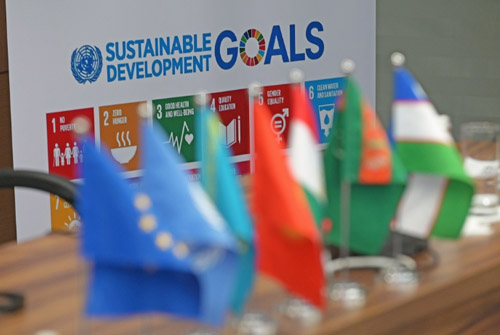This week, amid the rising numbers of COVID-19 infection cases, the largest vaccine warehouse in Central Asia was opened in Tashkent. Following the establishment of the Organization of Turkic States and the publication of a map of Turkic people by the organization last week, Russia had to remind Turkey that the roots of Turkic people are not in Turkey, but in Russia. Elsewhere, the Chinese Foreign Ministry called for the lifting of unilateral sanctions against Afghanistan, and Chinese companies started to study the possibilities of lithium mining in Afghanistan. Afghanistan was also on the agenda at the meeting between the foreign ministers of Central Asia and the European Union, and the EU and UNDP launched a regional platform for Sustainable Development Goals in Central Asia.

Image source: UNDP
On November 20, the largest warehouse in Central Asia for storing vaccines with various temperature regimes opened in Tashkent (See: The Times of India, R.). This warehouse will become a logistics center for the entire national immunization program and will expand Uzbekistan's ability to supply and manage vaccines.
Following the launch of the Organization of Turkic States last week in Turkey, Kremlin representative Dmitry Peskov noted with regret that "the map, which was presented to Turkish President Erdogan, did not mark the "center of the Turkic world" in Russia - in Altai." (See: Tass, Sputnik) The map was presented after the summit of the Cooperation Council of Turkic-speaking states adopted the declaration "Vision of the Turkic World until 2040." According to the document, the general identity of the Turks is a "source of cultural wealth."
At a press briefing on November 22, Chinese Foreign Ministry spokesman Zhao Lijian announced the lifting of unilateral sanctions against Afghanistan (See: Reuters, Voice of America). Additionally, China has started to ship large-scale humanitarian supplies to Afghanistan that should help the Afghan people overcome some of their difficulties. The Chinese authorities are said to be determined to help the reconstruction of Afghanistan.
Meanwhile, representatives of five Chinese companies arrived in Afghanistan on special visas to conduct on-site inspections of potential lithium mining projects (See: Global Times, Sputnik). In addition to the five Chinese companies currently in Afghanistan, at least 20 more Chinese public and private firms have also submitted requests for participation in lithium projects. However, despite growing interest and field inspections, serious obstacles and risks remain for any potential project, and many companies are likely to take a wait-and-see position until conditions improve.
Afghanistan’s situation was also on the agenda during the seventeenth meeting of the Ministers of Foreign Affairs of Central Asia and the European Union, held on November 22 in Dushanbe (See: RadioFreeEurope, Euractiv). Discussing the regional security issues, the parties emphasized the need for joint efforts, particularly in the areas such as border protection, through the implementation of the BOMCA/KADAP program. The parties also discussed furthering cooperation between the countries of Central Asia and the EU, taking into account the consequences of the Covid-19 pandemic, as well as regional and global processes. The state of relations and the prospects for strengthening ties between the two regions in the political, trade, economic, water, and energy fields were also discussed by the ministers and special attention was paid to cooperation in the field of security, the fight against terrorism and extremism, the environment, and climate change.
The EU, jointly with the UNDP, have also announced the launch of a new knowledge-sharing platform on Sustainable Development Goals (SDGs) for Central Asian countries in Kazakhstan (See: UNDP, The Times of Central Asia). The objective of the Platform is to work with the governments and the civil society actors in Kazakhstan, the Kyrgyz Republic, Uzbekistan, Tajikistan, and Turkmenistan to achieve the SDGs. In view of the effects of the pandemic on Central Asian societies, an agreement was signed between the EU and the UNDP Kazakhstan earlier this year in the amount of 1 million Euros to facilitate the process of knowledge exchange between the countries of the region. The SDG knowledge-sharing platform will play an important role in integrating and mobilizing efforts at both national and regional levels and will help the governments and societies to build institutional capacity, finance, and address the adverse effects of the COVID-19 pandemic in the region.

